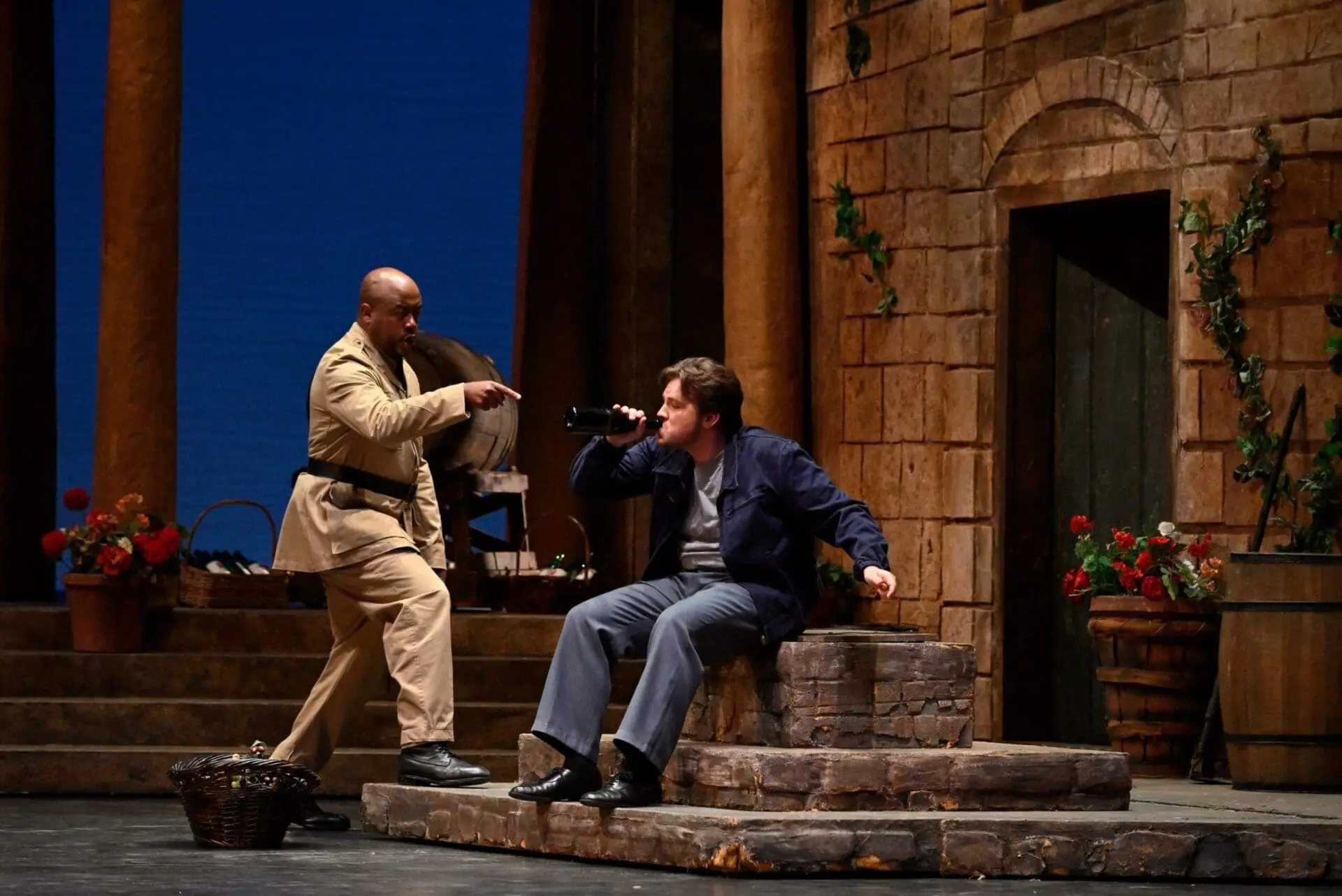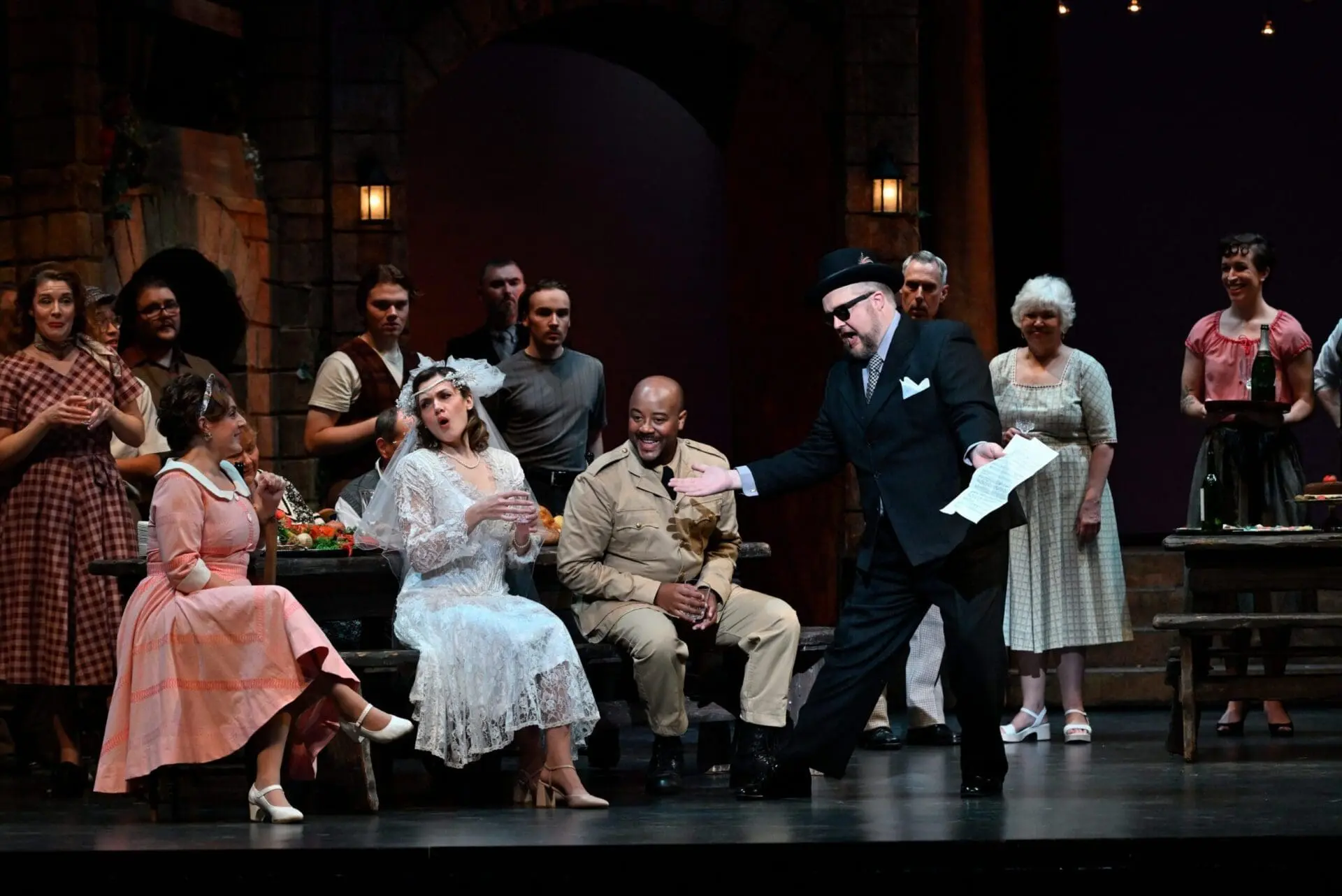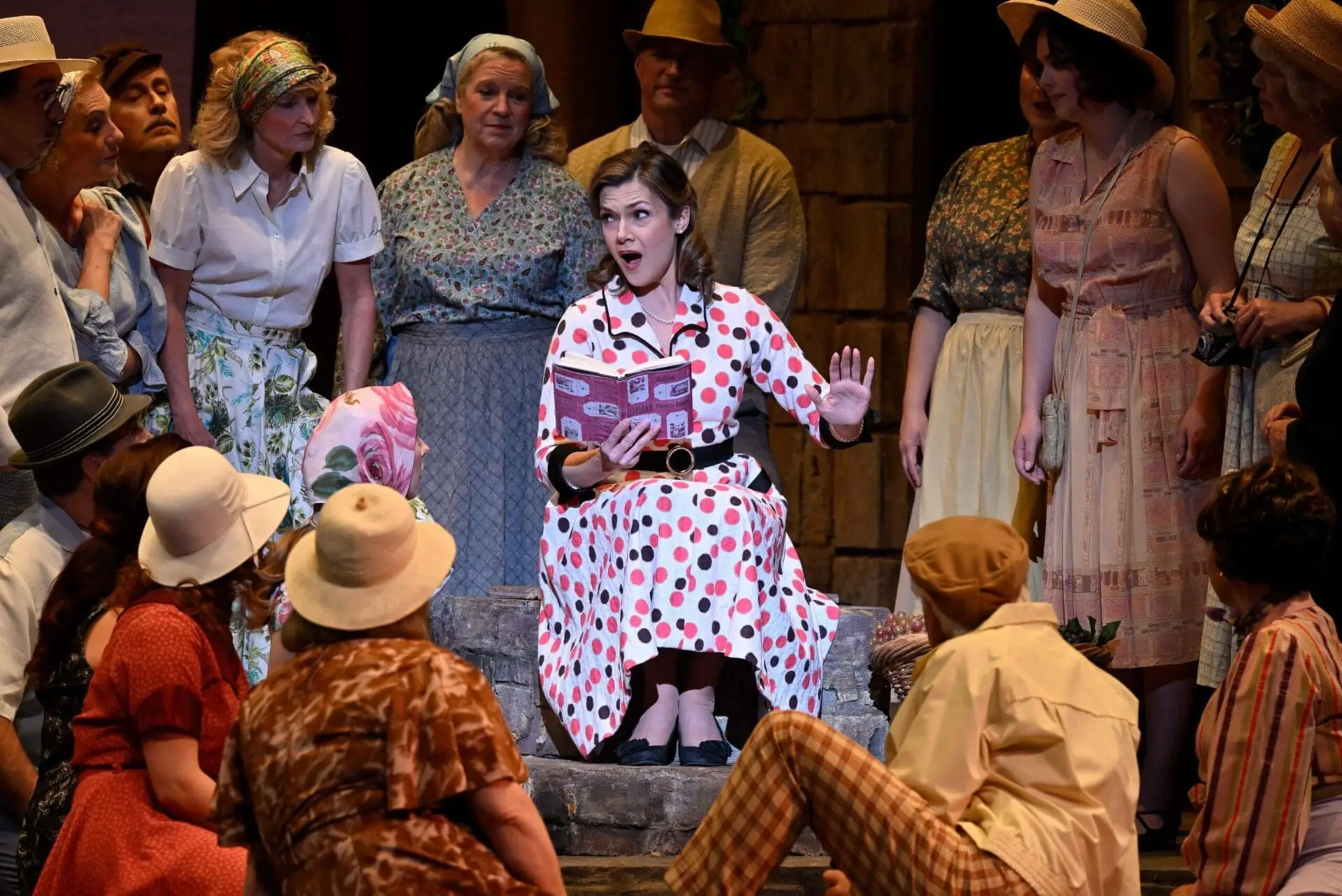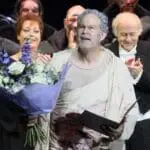Local audiences were treated to one of opera’s great “rom com’s” this fall, as Manitoba Opera opened its 2024/25 season with Donizetti’s The Elixir of Love, last performed here in 2005.
The company’s latest production that ran October 26th through November 1st, directed by Ann Hodges, also welcomed back world-renowned soprano Andriana Chuchman as feisty protagonist Adina. The Winnipeg-born singer made her auspicious Metropolitan Opera debut in the same principal role in 2014, when she filled in on scant, 48-hour notice for ailing Russian soprano Anna Netrebko, setting her already rising international career aflame.
With the opera buffa now transplanted to the 1950s, Adina appears as a capricious, well-heeled tour guide who shepherds a chorus of tourists into a rustic Italian village as they snap pictures and gaze in wonder at its antiquities. It’s a premise that (mostly) works, with designer Constantinos Kritikos’s realistic, multi-tiered sets on loan from New Orleans Opera able to leap across the centuries while creating an effective visual canvas for the singers, lit in golden, sun-drenched hues by Scott Henderson.
Chuchman, who sang Giannetta in MO’s 2005 production, immediately displayed her crystal clear, shimmering vocals and spot-on intonation during Act One’s “Della crudele Isotta,” in which she spins her tale of Isolde’s love potion that sets the narrative in motion. Her keen acting skills allowed her to traverse the emotional trajectory as she moves from haughty fashionista who flips though glamour magazines and mercilessly taunts the “less than successful” Nemorino, to an achingly vulnerable dreamer yearning for her own happy ending as she ultimately realizes she’s fallen for the village peasant.
Chuchman also charmed us with her rendering of Act II’s “Prendi, per me sei libero,” in which she nimbly tossed off effervescent coloratura passages while equally navigating larger leaps with every note perfectly placed.
American tenor Jonah Hoskins crafted a hopelessly innocent Nemorino, with his mellifluous voice first heard in the first act’s “Quanto è bella, quanto è cara,” as he moons for Adina before becoming increasingly distraught as she continues to rebuff him. His flailing about the stage as he becomes drunk on Dulcamara’s “elixir,” and, in one of the show’s funniest moments that showed off his knack for physical comedy, practically wrenching the doctor’s arm off as they seal their deal with a “handshake” and eliciting loud guffaws from Saturday’s opening night crowd, proved that slapstick humour will always find a home on the often rarified opera stage.
Hoskins also bared his soul during his eagerly anticipated “Una furtiva lagrima.” The tenor wrung every ounce of emotion from its lushly lyrical lines with his ringing upper notes. One can only imagine how his interpretation of this perennial showstopper will deepen and grow in years to come with even further resonance.

Photo Credit: R. Tinker
Belcore (Jorell Williams) and Nemorino (Jonah Hopkins) in Manitoba Opera’s Elixir of Love
What a joy to see Canadian baritone Peter McGillivray grace this stage again, who last appeared as Don Magnifico in MO’s 2022 fairy tale production of La Cenerentola. Once again, the beloved singer – and force of nature – brought his razor-sharp comedic chops to his larger-than-life portrayal of Dulcamara, spitting out his Italian text with clear diction during his opening “Udite, udite, o rustici,” in which he boasts to the tourists he “has a cure for everything.” Two supernumeries (Paul Forget and Reynaldo Gomezo) flanked Dulcamara as silent, Mafioso-styled sidekicks, and this nice touch underscored his presence with a sense of danger – or fear.
McGillivray’s Act Two barcarolle with Adina, “Io son ricco e tu sei bella,” was another highlight. In it, he imagined her as a beautiful gondoliera and rowed his “boat” with a baguette, while his rich baritone, as deep as the bonny blue sea, was propelled by a stream of deliciously rolled “r’s.”
American-born, Canadian-based baritone Jorell Williams burst onstage as the supremely confident Sergeant Belcore, and his opening “Come Paride vezzoso” highlighted his lyrical phrasing and crisp, articulated runs that were executed with military precision. Winnipeg-based singing-actress Karen Santos made every moment count during her relatively brief stage time as Adina’s friend Giannetta, and she delivered a satisfying “Saria possibile?” with the women’s chorus.
The Manitoba Opera Chorus, skillfully prepared by long-time MO chorus director/repetiteur Tadeusz Biernacki, was in fine voice throughout, and Hodges’s thoughtful blocking was evident during the chorus scenes, including Act Two’s particularly zesty wedding banquet in preparation for Adina and Belcore’s nuptials. The incomparable Tyrone Paterson led the Winnipeg Symphony Orchestra through Donizetti’s melodious, hit-filled score. Special notice should be given to principal bassoonist Kathryn Brooks for her buttery smooth accompaniment during Hoskins’s heartfelt aria.
Stylish frocks, simple peasant wear and tourist garb provided by Winnipeg’s Harlequin Costume and Dance recalled the luscious, mid-20th century vibe of La Cenerentola while injecting the stage with further colour and visual punch.
Donizetti’s deceptively simple melodramma giocoso, sans the typical plot machinations and convulations of grand opera, is essentially about love – a theme that never grows old. However, it’s also about hope in all its guises, whether that entails a magical potion to win love or even hoodwinking villagers to create a perceived better life. While undeniably a safer choice in which to open a new season as opera companies worldwide continue to rebuild pandemic-stricken audiences, Manitoba Opera’s latest production offered an evening of high-spirited fun that never grows old.

Photo Credit: R. Tinker
Dr. Dulcamara (Peter McGillivray) beguiles the guests at the wedding feast
Opera Canada depends on the generous contributions of its supporters to bring readers outstanding, in-depth coverage of opera in Canada and beyond. Please consider subscribing or donating today.
















